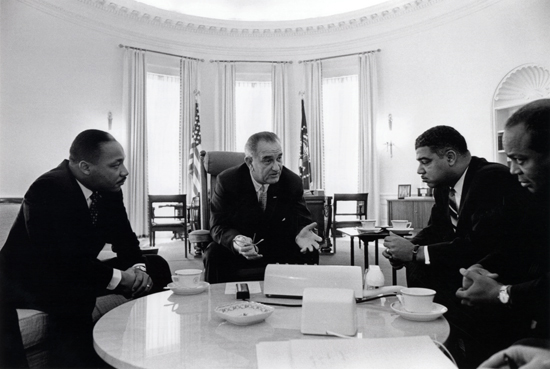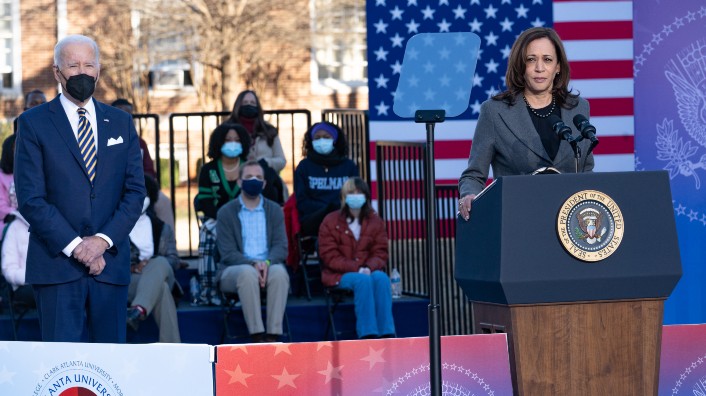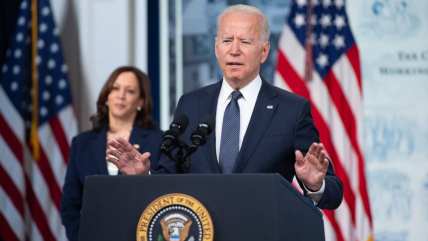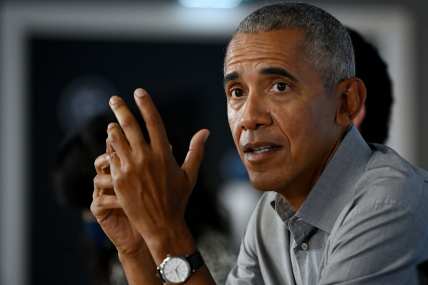Biden White House advisor Cedric Richmond reflects on King’s legacy and ongoing fight for justice
EXCLUSIVE: Similar to Dr. King, Richmond occupies a unique space as a Black man advising a sitting U.S. president on policy impacting Black and minority Americans. He tells theGrio he doesn't take that responsibility lightly.
Cedric Richmond, senior advisor to President Joe Biden and director of the White House Office of Public Engagement, shares a few things in common with Dr. Martin Luther King Jr.
Not only did Richmond and Dr. King both attend the nation’s only all-male HBCU, Morehouse College, in Atlanta, Georgia, but he also occupies a unique space as a Black man counseling a sitting U.S. president on important policy issues, particularly those impacting Black and minority Americans.

“I look at it as a great partnership in the White House, and unlike Dr. King, I have a little bit of a different role because Dr. King’s role was to continue to push and to create the movement [and] the moment and create the demand for change,” Richmond told theGrio during an exclusive interview.
King’s fight to end racism and inequality in the United States took him many places – from the streets of Selma and Montgomery, Alabama to church pulpits across the South – but none more consequential than The White House, the most powerful place in America, and arguably the world.
The momentum King was able to build as a pioneer in the civil rights movement of the 1950s and 1960s through nonviolent disobedient activism brought him great political influence and several invitations to 1600 Pennsylvania Avenue.
Dr. King’s relationship with the White House dates back to 1958 when he and other Black civil rights leaders visited President Dwight Eisenhower to push him on adopting their strategy of ways to address racial violence and discrimination. He would return to the White House to counsel President John F. Kennedy on the Civil Rights Act of 1964, and continued to do so after Kennedy’s assassination, advising President Lyndon B. Johnson through the civil rights bill’s passage as well as the Voting Rights Act of 1965.

King’s political activism and success in pushing the nation closer toward his “dream” of a United States absent of racial oppression ultimately led to his assassination, but his tireless efforts helped turn the tide in Washington and led to pivotal legislative progress for Black Americans who had finally gained civil rights protections under the law and earned the sacred right to vote.
But in 2022, equal access to voting polls remains in jeopardy for Black and minority Americans since The Supreme Court gutted key components of the Voting Rights Act. After former President Donald Trump and Republicans in Congress were handed stunning defeats in the 2020 elections, following record turnout of Black and Brown voters, several Republican-controlled states have passed restrictive voter laws making it harder for them to cast their ballots in future elections.
“We’re fighting some of the same struggles that [King] fought,” reflected Richmond. “It’s important to remind people that we don’t celebrate Dr. King for having a dream. Everybody has a dream. We really celebrate him for having the courage and the conviction to follow his morals and to pursue that dream at great risk to him and his family. He knew that that was the risk, but he worried about the next generations. He worried about the country that he lived in.”
President Joe Biden and Vice President Kamala Harris evoked Dr. King’s life’s work of activism in their public remarks on the joint campuses of Morehouse, Spelman College and Clark Atlanta University last week pushing for the U.S. Senate to vote in favor of new voting rights legislation that would restore the 1965 Voting Rights Act that King helped to get passed and create greater federal protections for Black and minority communities.

Richmond, a former U.S. congressman who served as chair of the Congressional Black Caucus, vowed that the Biden-Harris administration will “continue to push Congress and put the full weight of the White House behind it.”
“Being in the White House, I just have to make sure that we do as much as we possibly can,” he added.
While the fight for voting rights is at fever pitch right now in Washington, Richmond touted the Biden-Harris administration’s early commitment to equity and inclusion. Much of its work to end poverty and inequality is a continuation of what Dr. King fought to achieve.
“If you look at our administration, it’s the most diverse in history. If you look at the legislation that we’re crafting [and what] we do with … Black issues in mind, whether it’s community violence intervention, whether it’s Black maternal mortality, whether it’s reducing the Black poverty rate, the Black child poverty rate – which we cut in half this year – those are things we’re doing that are focused on equity and focused on the Black community,” he said.
Richmond also pointed to other efforts made by the administration to achieve justice for African Americans and communities of color despite a lack of action in Congress, including the Department of Justice banning the use of chokeholds and limiting the use of no knock warrants.
Richmond noted that the Biden-Harris administration also took steps to address voter suppression laws in the South by suing Georgia and Texas and installing two civil rights leaders, Vanita Gupta and Kristen Clarke, to lead the DOJ’s civil rights division.

“It’s a steady march towards justice, and … we’re making progress. It’s never going to be fast enough, especially for those who are discriminated against. But the one thing I will remind people is that we share that frustration,” said Richmond.
Recalling the youth activism of Martin Luther King Jr. and Richmond’s former colleague in the U.S. House, the late civil rights icon Rep. John Lewis, Richmond also had a message for young voters, urging them to stay engaged in the fight for equality and justice.
“Dr. King wrote his first op-ed when he was 17 and a student at Morehouse College in the Atlanta Journal Constitution – it was the Atlanta Journal back then – calling for equal rights for African American citizens,” he said.
“John Lewis, while a student at Fisk [University] started his career in fighting for civil rights [and] he was still a student when he spoke at the March on Washington.
He added, “So this notion that you have to wait to lead or get involved is just not true.”
Have you subscribed to theGrio podcasts “Dear Culture” or “Acting Up?” Download our newest episodes now!
TheGrio is now on Apple TV, Amazon Fire and Roku. Download theGrio.com today!


